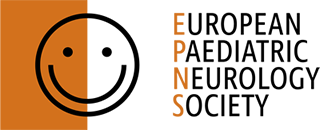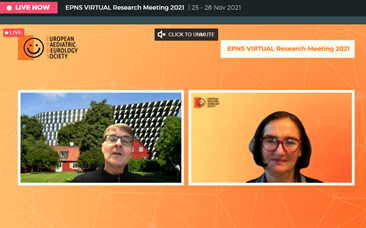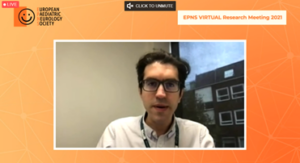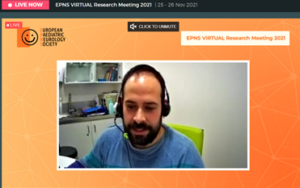Thank you to all involved in this inspiring meeting
Thursday 25 and Friday 26 November 2021
General information: The EPNS has been organising Research Meetings since 2008. With an aim to enhance research in Paediatric Neurology, the meeting brings together leaders in the field, active researchers and young fellows who are interested to join or to set up research projects. It is a forum for researchers in Paediatric Neurology, where they present their work, ideas, results, creating the possibility for good interaction between researchers and premises for networking, future collaborative research in Europe and beyond. Experienced professionals and young researchers get together, in an environment where interactive, vivid discussions can take place around the presented topics.
EPNS Research Meeting 2021 was FULLY VIRTUAL
In response to the ongoing COVID-19 pandemic, the planned 2020 meeting in Stockholm was postponed until 2021. After careful consideration, the decision was taken that the 7th EPNS Research Meeting in 2021 would be a fully virtual event. Building on our previous experience, we provided a fulfilling and enjoyable virtual experience, with confidentiality of information a primary focus. Accredited by the European Accreditation Council for Continuing Medical Education (EACCME®) with 9 European CME credits (ECMEC®s).
EPNS Research Prizes
Congratulations to the following who presented outstanding, innovative ideas in research in Paediatric Neurology and were each awarded the EPNS Research Prize 2,500 Euros:
Apostolos Papandreou, United Kingdom. Selected from the Movement Disorders Working Group, presented ‘Midbrain dopaminergic neurons derived from patients with autophagy-related mongenic parkinsonism are utilised for identification of disease-specific therapies’.
Apostolos reported: ‘I am really honoured by, and grateful for, this award. I will continue to work on developing novel therapies for rare neurological disorders, and this award will facilitate this effort and support my continuing professional development towards research independence’.
David Gómez Andrés, Spain. Selected from the Neuromuscular Working Group, presented ‘Pattern Recognition Muscle MRI in Early Onset Muscle Disorders: From Previous Works to Future Plans’.
David reported: ‘My plan is to use the award to continue the project of machine learning and data representation in muscle imaging. Probably, we will join this to other sources for hiring a young child neurologist to help us in this project and other ones we have ongoing.’
UPDATE NOVEMBER 2022, David reported ‘Currently, we have been studying the pattern of muscle involvement of TTN, NEB and sarcoglycans. Sarcoglycans are ready for publication in the last months of 2022 or the beginning of 2023. We have collected a number of TTN cases and we are pending of receiving more MRIs. We are beginning NEB cases of imaging. From the technical point of view, we are working with new pattern recognition techniques, including association rule algorithms and deep learning.’
Who was the EPNS Research Meeting aimed at?
The EPNS welcomed Child Neurologist researchers at all stages of their career: Leaders/senior colleagues, junior scientists and PhD students were all welcome and encouraged to attend.
Organising Committee:
- Professor Barbara Plecko, Chair EPNS Scientific and Research Committee, Universitätsklinik für Kinder-und Jugendheilkunde, Graz, Austria
- Professor Thomas Sejersen, EPNS Board member, Karolinska Institute, Stockholm, Stockholm
What delegates expected:
- All participants attended 3 Plenary lectures.
- Participants selected 2 of the 8 working groups: one from Band A and one from Band B.
- All participants attended selected project presentations from the 8 working group break-out sessions.
Programme:
Thursday 25 November 2021
11:00 Welcome.
11:09 Plenary lecture: Anna Lindstrand: “Zebrafish Models of Genetic Neurological Disorders”.
11:45 Lunch.
12:30 Working Group Break-out Rooms Band A*: 4 groups in parallel, participants attend ONE.
15:30 Break.
16:00 Working Group Break-out Rooms Band B**: 4 groups in parallel, participants attend ONE.
19:00 Break.
19:15 Social Event.
Friday 26 November 2021
09:15 Plenary lecture: Nadia Bahi-Buisson: “How to raise EU projects“.
09:55 Plenary lecture: Petter Brodin: “The Neuro-immune Interface in Health and Disease”.
10:30 Break.
11:00 Selected projects from the Working Group Break-out Rooms.
13:25 Presentation Awards and Closure.
13:30 Meeting ends.
Working Group Break-out Rooms
Band A*: the following 4 Working Groups ran parallel in break-out rooms. Participants selected to attend ONE of the following.
- Autoimmune and Infectious Diseases
- Movement disorders
- Neonatal Neurology & Developmental Neurology
- Stroke
Band B**: the following 4 Working Groups ran parallel in break-out rooms. Participants selected to attend ONE of the following.
- Ataxia
- Epilepsy
- Neurometabolic
- Neuromuscular
SCROLL TO THE END OF THIS PAGE TO SEE DETAILS ABOUT ALL OF THE 8 WORKING GROUPS.
EACCME® accreditation: The EPNS Virtual Research Meeting 2021, Virtual, United Kingdom, 25/11/2021-26/11/2021 has been accredited by the European Accreditation Council for Continuing Medical Education (EACCME®) with 9 European CME credits (ECMEC®s). Each medical specialist should claim only those hours of credit that he/she actually spent in the educational activity. “Through an agreement between the Union Européenne des Médecins Spécialistes and the American Medical Association, physicians may convert EACCME® credits to an equivalent number of AMA PRA Category 1 CreditsTM. Information on the process to convert EACCME® credit to AMA credit can be found at www.ama-assn.org/education/earn-credit-participation-international-activities. Live educational activities, occurring outside of Canada, recognised by the UEMS-EACCME® for ECMEC®s are deemed to be Accredited Group Learning Activities (Section 1) as defined by the Maintenance of Certification Program of the Royal College of Physicians and Surgeons of Canada.”
Number of Participants
- Limited to a maximum of 40 participants per working group.
- Allocated on a first come, first served basis.
IMPORTANT: OPEN TO EPNS MEMBERS ONLY
Participants had to be EPNS members who had paid their 2021 annual membership fee to attend this Research Meeting.
Registration Fees
EPNS annual membership fees are based on the World Bank income category of the country in which our EPNS members practice. The Virtual EPNS Research Meeting fees was based on the same income categories as follows:
| EPNS MEMBER GROUP | FEE: |
| WB123 and WB4B | 50 Euros |
| WB4A | 100 Euros |
This event was not be recorded.
READ ABOUT THE 8 WORKING GROUPS IN DETAIL:
EPNS Working group and Description |
Chairs |
| Autoimmune and Infectious Diseases working group welcomes contributions addressing all aspects of inflammatory CNS diseases, including autoimmune disorders, infectious diseases and further inflammatory processes affecting the nervous system. Primary goal of the group is to present own research projects. This may include presentations on finished and on newly planned projects. Proposals with calls for collaboration are particularly encouraged. | Martin Häusler Germany) EMAIL
Kevin Rostasy (Germany) EMAIL |
| Ataxia: Research in the field of the cerebellum and ataxia is growing fast over the last decade. The ataxia working group is an active group, focussing on international collaboration covering many multidisciplinary aspects of ataxia and the cerebellum. During this new workshop opportunity by an on-line platform, we cordially invite you to present, participate and learn about upcoming and on-going projects. If you have a project to share or discuss, if you would like to participate in international projects, or if you are interested in the amazing cerebellum, please feel welcome to join! | Deborah Sival (Netherlands) EMAIL
Maja Steinlin (Switzerland) EMAIL |
| Epilepsy working group is a very active formation of epilepsy researchers throughout Europe (many working in EpiCare affiliated centers, with collaborations overseas). We have collaborated in many successful projects and studies over the last years. We aim to discuss new research proposals, interesting recent and innovative studies and ongoing (multicentre) projects. During the virtual working group meeting in November 2021, we would like to give the floor to young researchers in the field to present their research ideas or results during short presentations of 10-12 minutes. We also invite members of ICNA, EPNS and EPICARE to prepare few slides on ongoing projects in their department, especially when they welcome collaboration with other paediatric epilepsy centres. We ask young researchers to submit their abstracts before the end of June 2021. If you do not plan to present your work, we would like to encourage you to attend our working group to participate in lively discussions. We look forward to receiving your contributions and to meeting you during the virtual EPNS research meeting. | Floor Jansen (Netherlands) EMAIL
Lieven Lagae (Belgium) EMAIL Alexis Arzimanoglou (France) |
| Movement Disorders Dr Jean-Pierre Lin and Prof. Michel Willemsen (Joint Chairs) for the Virtual EPNS Research Meeting in Stockholm 25-26th November 2021 invite you to present your work on any aspect of movement disorders in children and young people. The purpose of the meeting is to allow clinical science researchers to discuss their work, which can span any aspect from the bench to the bedside, in an interactive, positive, and stimulating program and setting. We are particularly interested in clinicians, including allied health professionals, currently or recently involved in work leading to a doctoral thesis. Please contact both of us with a synopsis of your ideas and proposals for the meeting. | Jean-Pierre Lin (UK) EMAIL
Michel Willemsen (Netherlands) EMAIL
|
| Neonatal Neurology & Developmental Neurology: The scientific programme and discussion will cover newest research data on models of perinatal brain injury such as hypoxia and ischemia, and excitotoxic injury, as well as their effects and their contribution to clarify the pathophysiology of acquired neonatal brain injury. We will also include groups interested in brain development, including fetal neurologists and specialists of cortical malformations from basic scientist, neuro(foeto)pathologists, fetal radiologist to paediatric neurologist.
You are welcome to bring your own ideas, to inform about your own model, to get help in choosing an appropriate model for your own research questions. We would like to develop collaborative work within this group, from basic scientists to clinics. Information on neuroprotective strategies will be shared and possible joint research on fetal and perinatal brain injury will be discussed. We are looking forward to the presentation of your own ongoing research in this area. We will give you 10-15 min slots for presentation and discussion! Please submit your contribution with a title and a short summary on the topic. If you do not plan to present your work, we would like to encourage you to attend our working group to participate in lively discussions of ongoing projects. |
Nadia Bahi-Buisson France) EMAIL
Regina Trollmann (Germany) EMAIL |
| Neurometabolics: The Neurometabolic Working Group is happy to accept research projects on pathomechanisms, diagnosis, care and treatment of paediatric neurometabolic disorders. The provided platform will enable stimulating and substantial input from experts and peers alike and offers a great opportunity to establish or strengthen European research networks in the field of neurometabolic disorders in child neurology. We explicitly encourage young researchers to present projects at various stages of realisation – from application or recruitment to preliminary conclusions or final results. See you in our first virtual EPNS Research Meeting : ) | Barbara Plecko (Austria) EMAIL
Dimitrios Zafeiriou (Greece) EMAIL |
| Neuromuscular: The Neuromuscular Working Group aims to discuss the latest research developments relevant for the diagnosis, care and treatment of paediatric neuromuscular diseases. The discussion will focus on the application of new approaches for clinical trials, implementation of novel therapies, and the European reference network for neuromuscular diseases (EURO-NMD). Further, new developments and pitfalls in genetic diagnosis, impact of standards of Care, and transition to adulthood care will be discussed. The working group session also will offer an opportunity for scientists and clinicians to present and discuss own research ideas and results. | Guenther Bernert (Austria) EMAIL
Thomas Sejersen (Sweden) EMAIL |
| Paediatric Stroke: We are happy to invite you to the 3rd meeting of the Paediatric Stroke Working Group in Stockholm, 29-30 May 2020. After a keynote lecture we will be happy to learn more about your research projects in childhood neurovascular disorders (planned or already ongoing) and to discuss possibilities for a collaborative network. Ideas for research networks sometimes appear from unsolved cases – so please bring any interesting cases and/or diagnostic/management questions to our next meeting in Stockholm! We are really looking forward to seeing you there! | Lucia Gerstl (Germany) EMAIL
Finbar O´Callaghan (UK) EMAIL |



